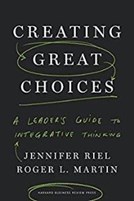- Behaviour
Integrative Thinking Revisited
Roger Martin and Jennifer Riel on creating great choices to inspire better decisions
While politics revolves around binary elections – Leave or Remain? Hillary or Donald? – in business choices can be a lot more nuanced. The difficulty is that when opposing, either/or, solutions are proposed it becomes hard for leaders to navigate the decision-making process.
‘Integrative thinking’, as defined by Roger Martin in his 2007 book The Opposable Mind, offers a way to address this difficulty. The concept was explained by Martin as "...the ability to constructively face the tensions of opposing models, and instead of choosing one at the expense of the other, generating a creative resolution of the tension in the form of a new model that contains elements of the individual models, but is superior to each.” So, rather than being forced into making trade-offs when it comes to hard choices, this approach focuses on creating new opportunities.
In their new book, Creating Great Choices, Jennifer Riel, an Adjunct Professor at the University of Toronto’s Rotman School of Management, and Martin, former Dean of Rotman, show how they have refined the understanding and application of integrative thinking through their research and work with executive teams, MBA students and even school kids over the past decade.

What emerges is that the concept can be applied to a broader range of problems than Martin had originally envisaged. However, although the theory is sound, because integrative thinking is not innate in people there is “…a gap between knowing and doing.” Integrative thinking needs to be learnt. The Opposable Mind uses a number of inspirational stories of individual CEOs and entrepreneurs, A.G. Laffey at Proctor & Gamble for example, to motivate the reader and to some extent this was counter-productive. First, because these leaders were too top-draw for most people to relate to and secondly because the application of integrative thinking is almost always about teams rather than just individuals.
The new book takes these lessons on board and focuses much more on the process of learning and practice, the methodology, and the tools and skills leaders need to cultivate integrative thinking. It also links the concept to the complementary theories of ‘behavioural decision making’ with its explanation of cognitive biases and ‘design thinking’ with its paths to innovation.
The book explains, with examples, how to master the four phases of integrative thinking: articulating opposing solutions; gaining a deep understanding of the opposing models; attempting to resolve the tension of these opposites by creating new superior models that contain elements of the originals; and finally testing the new models prior to applying them.
Making good choices is central to business and personal success. Integrative thinking is important because it provides a way out of our natural inclination to lose sight of the bigger picture by taking entrenched positions or to opt for shoddy compromises. Integrative thinking doesn’t choose one solution making a few trade-offs to placate the opposing view. Rather it looks for altogether new creative approaches.
In their final chapter Riel and Martin consider the application of integrative thinking in the broad context of taking a stance in the world, and using the example of Unilever – both its founder’s Port Sunlight initiative and the current CEO Paul Polman’s approach – show how integrative thinking can be applied to reconcile the opposing short- and long-term forces of corporate profit and social good.
Creating Great Choices: A Leader’s Guide to Integrative Thinking, Jennifer Riel and Roger Martin, Harvard Business Review Press, ISBN 978-1-63369-296-1
Rotman School of Management is Canada’s leading business school and has Canada’s largest group of management faculty. It is home to some of the most innovative research institutes in the world
ARTICLES YOU MIGHT LIKE
RESEARCH
Harvard and BC University study values conversational receptiveness in our polarized times
DEVELOPING LEADERS QUARTERLY MAGAZINE AND WEEKLY BRIEFING EMAILS

































